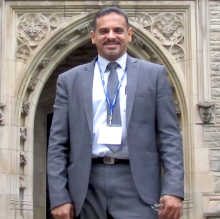Presented by Khaled Karam, Fulbright Scholar and visiting researcher at Case Western Reserve University, PhD, Assistant Professor of English Literature, Faculty of Arts, Suez University. ORCID link: https://orcid.org/0000-0002-4210-1147
Abstract: To be condensed in communications and narratives has become a matter of compulsion. Thus, it is important to investigate the distinctive nature of narrative and recent transformations occurring in its various strategies and structures because we cannot help but live in narrative, a medium of self-expression and a tool of cognition. This study argues that compression is a fundamental feature of contemporary narrative, such as microfiction, used as a strategic method to save time and space and to grip readers’ decreasing attention in the time of data inundation. Thus, the principle of the least utterance has become a governing rule of narrative disseminated through cyberspace. The core of this study aims at explaining the process of meaning construction through compression and realizing how it is configured in an intricate schema of mapped mental spaces. This distinguished type of mapping connects base space with gradually subsequent minimized progenial spaces bearing the same genomic features from the base space. Each progenial space is mapped with its previous one and with peripheral spaces in which the admissible but tractable elements are stored for retrieval in the process of decompression. The cognitive approach to creative skills entails an incremental practice in order to cultivate communicative compression. Therefore, this study suggests some strategies for compression in addition to Fauconnier and Turner’s conceptual blending (2002).


